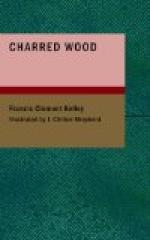The priest was silent for a moment, but Mark knew that he had not quite finished.
“The rich young man of the Scriptures went to Christ and asked what he should do to be saved. He got his answer. Was Christ in his way? Was the answer a restraint upon his liberty?”
“No,” answered Mark, breaking in, “it was not a restraint upon his liberty. But you say that Christ is God, so the young man had nothing between himself and his God.”
“Oh, yes, he had,” said the priest. “He had the command or counsel that Christ gave him. It was against the command or counsel that he rebelled. Now have not I, and you, and all the world, the same right to get an answer as that young man had? Since we are all equal in the sight of God, and since Christ came for all men, have we not the right to an answer now as clear as His was then?”
“It seems logical,” admitted Mark.
“Then,” said Father Murray, “the unerring Voice must still be here. Where is it?”
“Yes,” retorted Mark, “that is my cry. Where is it? I think it’s the cry of many other men. What is the answer?”
“It is the thing that you threw over—or believed you had thrown over—and that you can’t get away from thinking about. It waits to answer you.”
A silence settled between the two men. It lasted for over a minute. Finally Mark broke it.
“You told me, Father,” he said, “that what I called ’Mrs. O’Leary’s philosophy’ was religion. I now know better what you meant, for I have been gossiping about you. The best point you make is—yourself. I know what you have been, what you have done, and how sadly you have suffered. Doesn’t your religion demand too much—resignation? Does a God of Justice demand that we tamely submit to injustice? I am not saying this to be personal, or to pain you, but everyone seems to wonder at your resignation to injustice. Why should such a fault be in the Church you think so perfect?”




